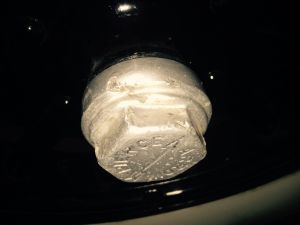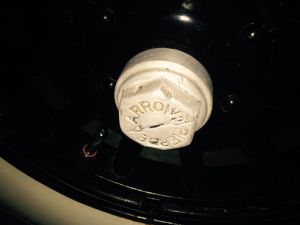- Home
- About Us
- Join/Renew
- Member Benefits
- Member Pages
- Log In
- Help
- Museum Store
Does anyone reproduce the Series 80 hub caps?
Randy,
I don’t believe that anyone does a reproduction of those hub caps.
What is the problem with the set on your car?
Are they dented, wrenched, or what?
Attaching a photo will be helpful.
Spares are around, but you need to ask snd look on eBay and at Hershey.
Peter
Dented, wrenched, etc.
I will be looking around for some in better condition.
Thanks!
Randy,
Post a photo of the four of them.
I have a spare set and my dents and wrench marks may be less severe than are yours.
This is why one uses Anti-Seize on the hub threads.
Peter
I have an extra set as well. Randy post a photo of yours and I’ll see if mine are any better. tom griffith
Pics of the worse pair: am I being too particular?

The other one:

Anyone have any ideas as to how these might have been manufactured? They almost appear to have been hot-pressed, rather than cast. If so that seems to be an advanced process for the 1920s and for a light-duty part.
Randy,
You are not being too particular, as your caps are chewed up a bit.
I always wonder if they can be “worked” but who knows.
I have a feeling that the caps were cast, as on the inside of a few that I have there seems to be in the center, a casting sprue nub.
Someone else will certainly have an opinion.
Peter
I think you are right: perhaps lost-wax casting? Considering the detail of the lettering it’s a quality piece of work (after all it’s a Pierce-Arrow !). The only machining seems to be maybe the internal threading and removing the sprue.
I think I can dress mine up and make a considerable improvement; I am just eaten up with investigative curiosity.
Any idea of the letter colors? Most I have seen which are painted are either all black, or black letters with a red arrow.
RR
Randy,
Remember that it is a Pierce-Arrow, so you could order it an any color you wished, including the color on the hubs.
However, I would avoid Day-Glo Lime Green.
Peter
The one of the processes for making that part from steel sheet would be what is called drawing and ironing. That is how 2 piece beverage cans are made. You would need better steel than what was available then to stamp that cold. It could be hot forged also.
Another way to tell if it is cast is to measure the thickness in various areas
These are not made from sheet; they appear to be cast aluminum but I am not a casting specialist.
Aluminum
They are made by the same process as were model T Ford ones. Except early Ford were brass & these are Aluminium. Pressed with dies.
Here in Australia Similar hubcaps (not Pierce) are being made by lost wax (investment casting)They will make special orders http://www.vintageandclassicreproductions.com Cheers
Thanks for that interesting link.
Randy,
Your hub caps really are not all that bad and are repairable. There are two methods for repairing.
First, you can TIG weld the low areas then straighten everything up by filing the welded ares straight. Follow this up by sanding with progressively smoother grit sandpaper until you can buff them out to a natural shine that will look almost chrome like.
Secondly, you can pick the low ares out by using a small punch and hammer then move on the file, sandpaper, and buffing.
Either way will yield good results but will take some time and patience. Good luck….
Thanks, Philip. I have an extra cap and after studying it I can see you are right. Cosmetic flaws tend to look worse than they really are, anyway.
Randy,
When you are all done making them beautiful, coat the threads of the cap and the wheel with a thin coat of Anti-Seize to keep then from binding.
Your caps are damaged because some impatient person took a steel wrench to them to crank them off of the wheel.
They should have liberally applied some penetrating oil.
Your P-A wheel wrench should just dislodge them and from there on, you should remove them by hand.
Mine are on firmly, but hand tight.
I would cover them with a latex glove, or something, before putting any kind of wrench on them.
Peter
Also, on wheel related matters, the lug nuts on the wheels are torqued to only 25-ft-lbs.
The P-A lug nut wrench is short to keep the torque down.
If you over-torque the lug nuts, you will stretch the relatively soft steel stud threads.
